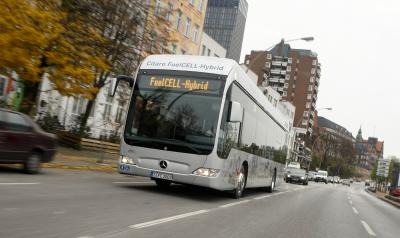
Decisive step for the widespread commercialisation of hydrogen-powered fuel-cell buses
The CHIC (Clean Hydrogen in European Cities) project got underway in Cologne on 4 November. The project funded by the EU will permit the integration of 26 fuel cell buses into daily regular services in five European cities. At least three manufacturers – Mercedes-Benz, Van Hool and Wrightbus – will be supplying fuel cell hybrid vehicles in this project.
The project is based on a gradual introduction of hydrogen-powered fuel cell buses and aims to set up bus fleets with fuel cell vehicles and the necessary infrastructure.
The vehicles will go into service in Aarau, Bolzano, Milan, London and Oslo. Experience will also be leveraged from ongoing projects in cities such as Berlin, Hamburg, Cologne and Whistler (Canada) – cities that, among other things, have already been involved in successful previous CUTE and HyFLEET:CUTE projects run between 2003 and 2009. The experience garnered in the project should support and guide 14 regions in Europe through the next stage, as they start setting up fuel cell fleets and the corresponding infrastructure.
Mercedes-Benz Citaro FuelCELL Hybrid
The Mercedes-Benz Citaro FuelCELL Hybrid made its debut in Hamburg in November 2009. The latest-generation fuel-cell hybrid bus boasts all-round environmental compatibility: it generates zero emissions and virtually no noise. As such, the Citaro FuelCELL Hybrid is ideally suited for operations in congested inner cities and metropolitan areas.
Thanks to improved fuel cell components and hybridisation with lithium-ion batteries, the Citaro FuelCELL Hybrid consumes almost 50 percent less hydrogen than the previous generation. The fuel cell bus has a range of around 250 kilometres. The drive system with fuel cell is virtually maintenance-free and boasts a long service life.
Daimler will use the Citaro FuelCELL Hybrid as part of its involvement in a large-scale fleet trial in the CHIC project. The company is following on from the successful European Union CUTE and HyFLEET:CUTE projects, which were implemented between 2003 and 2009. Overall, 36 Mercedes-Benz Citaro buses with a second-generation fuel-cell drive have proven themselves with twelve transport operators on three continents. Having clocked up more than 140,000 operating hours and over 2.2 million kilometres, the Mercedes-Benz buses are testimony to the practicality of the environmentally friendly fuel-cell drive.
The global initiative Shaping Future Transportation consolidates all the activities for sustainable mobility in the Commercial Vehicle Division of Daimler AG. The aim of this initiative is to employ clean and efficient drive systems and alternative fuels to make the zero-emission commercial vehicle of tomorrow a reality.
Shaping Future Transportation involves conserving resources, reducing emissions of all types and, at the same time, ensuring the highest possible levels of road safety. In this respect, the Citaro FuelCELL Hybrid – developed with support from the European Union – plays an important role.



